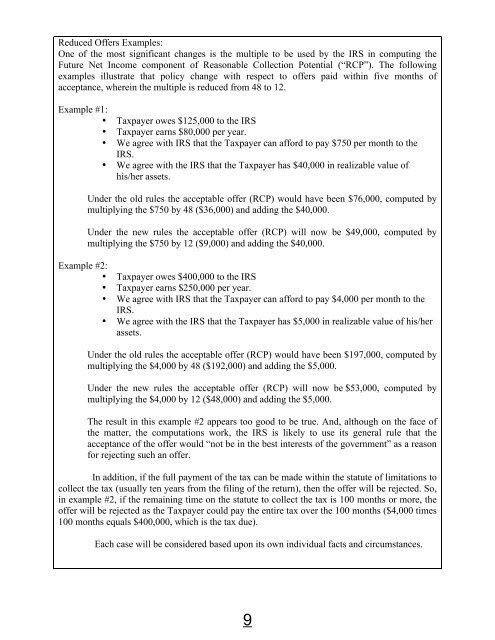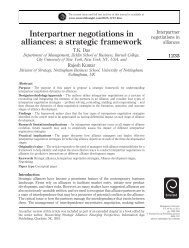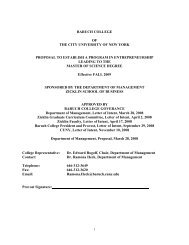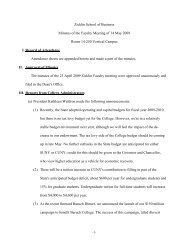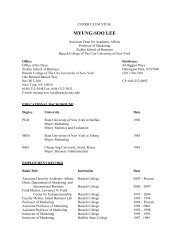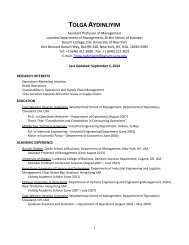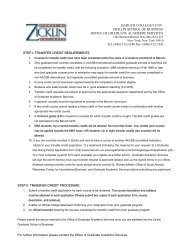- Page 1 and 2: The Zicklin Tax Seminar Series Tax
- Page 3 and 4: E. MARTIN DAVIDOFF & ASSOCIATES CER
- Page 5 and 6: 5
- Page 7: • Payments of more than 24 months
- Page 11 and 12: 2 If you have any questions, please
- Page 13 and 14: FACTS OFFER IN COMPROMISE CASE STUD
- Page 15 and 16: Form 433-A (OIC) (Rev. May 2012) Us
- Page 17 and 18: Section 3 (Continued) Cash value of
- Page 19 and 20: Section 5 Business Income and Expen
- Page 21 and 22: Section 8 Other Information Page 7
- Page 23 and 24: L:\EMD\433Case11:B Personal Liabili
- Page 25 and 26: 433CASE12.123 John & Jane Doe 08/17
- Page 27 and 28: Form 656 (Rev. May 2012) Department
- Page 29 and 30: Section 6 Designation of Down Payme
- Page 31 and 32: Form 656 (Rev. May 2012) Department
- Page 33 and 34: Jim and Kelly Smith SS#: 123-45-678
- Page 35 and 36: Offer In Compromise Package Logisti
- Page 37 and 38: New Jersey - Local Standards: Housi
- Page 39 and 40: One Car Two Cars Houston $312 $624
- Page 41 and 42: Print Email Reports Export Reports
- Page 43 and 44: Internal Revenue Manual - 5.8.5 Fin
- Page 45 and 46: Internal Revenue Manual - 5.8.5 Fin
- Page 47 and 48: E. Martin Davidoff - Offer in Compr
- Page 49 and 50: Form 656 Booklet Offer in Compromis
- Page 51 and 52: an offer unless the trust fund port
- Page 53 and 54: Step 2 - Fill out the Form 433-A (O
- Page 55 and 56: Section 2 Business Asset Informatio
- Page 57 and 58: Page 4 of 6 Section 3 Business Inco
- Page 59 and 60:
Section 7 Signatures Page 6 of 6 Un
- Page 61 and 62:
Rules of Engagement in Dealing With
- Page 63 and 64:
Rules of Engagement: Dealing With I
- Page 65 and 66:
IRS Rules of Engagement: Under Prom
- Page 67 and 68:
Dealing with the IRS Regarding Coll
- Page 69 and 70:
I R S R E P R E S E N T A T I o N A
- Page 71 and 72:
R.C.P. OLD NEW Monthly Excess $361
- Page 73 and 74:
R.C.P. - Example #1 OLD NEW Monthly
- Page 75 and 76:
May 21, 2012 OIC Rules • There wi
- Page 77 and 78:
May 21, 2012 OIC Rules • State an
- Page 79 and 80:
May 21, 2012 OIC Rules Substantial
- Page 81 and 82:
E. MARTIN DAVIDOFF & ASSOCIATES CER
- Page 83 and 84:
Steps in a Controversy 1. Initial c
- Page 85 and 86:
Alternatives in a Collection Matter
- Page 87 and 88:
E. MARTIN DAVIDOFF ATTORNEY AT LAW
- Page 89 and 90:
Mr. & Mrs. Mickey Mantle January 5,
- Page 91 and 92:
E. MARTIN DAVIDOFF & ASSOCIATES CER
- Page 93 and 94:
Form 2848 (Rev. 3-2012) Page 2 6 Re
- Page 95 and 96:
Excerpts from the Internal Revenue
- Page 97 and 98:
97
- Page 99 and 100:
Sample Status Sheet GOALS of Johnny
- Page 101 and 102:
E. MARTIN DAVIDOFF ATTORNEY AT LAW
- Page 103 and 104:
6. Request for a Collection Due Pro
- Page 105 and 106:
Information You Need To Know When R
- Page 107 and 108:
Collection Appeal Request 1. Taxpay
- Page 109 and 110:
John J. and Jane Doe Form 9423 Coll
- Page 111 and 112:
experience is that we secure better
- Page 113 and 114:
E. MARTIN DAVIDOFF ATTORNEY AT LAW
- Page 115 and 116:
Department of the Treasury - Intern
- Page 117 and 118:
117
- Page 119 and 120:
E. MARTIN DAVIDOFF ATTORNEY AT LAW
- Page 121 and 122:
Mr. William Skowron December 12, 20
- Page 123 and 124:
Form 9465-FS (12-2011) Page 2 Part
- Page 125 and 126:
INSTRUCTIONS TO TAXPAYER If not alr
- Page 127 and 128:
Mr. Yogi Berry September 19, 2011 P
- Page 129 and 130:
Mr. Jeffrey Austin January 5, 2011
- Page 131 and 132:
131
- Page 133 and 134:
Texas Iowa, Kansas, Louisiana, Miss
- Page 135 and 136:
4. Filing of Tax Court Petition In
- Page 137 and 138:
137
- Page 139 and 140:
139
- Page 141 and 142:
Yogi Berra Estimated 2011 - 2012 Ca
- Page 143 and 144:
BY HAND IN OUR OFFICE Mr. and Mrs.
- Page 145 and 146:
Representing Clients Before the IRS
- Page 147 and 148:
Rules of Engagement in Dealing With
- Page 149 and 150:
Rules of Engagement: Dealing With I
- Page 151 and 152:
IRS Rules of Engagement: Under Prom
- Page 153 and 154:
Dealing with the IRS Regarding Coll
- Page 155 and 156:
IRS Announces New Effort to Help St
- Page 157 and 158:
Under New Rules, the IRS Will Now R
- Page 159 and 160:
Adjustments to IRS Lien Policies 15
- Page 161 and 162:
DIRECT DEBIT INSTALLMENT AGREEMENT
- Page 163 and 164:
LIEN HAS BEEN RELEASED 163
- Page 165 and 166:
165
- Page 167 and 168:
617-316-2608 617-316-2606
- Page 169 and 170:
Online Payment Agreement Applicatio
- Page 171 and 172:
OUTDATED 171
- Page 173 and 174:
173
- Page 175 and 176:
October 2011 Your Access to Free Cr
- Page 177 and 178:
FTC Facts For Consumers 3 access it
- Page 179 and 180:
FTC Facts For Consumers 5 or an unp
- Page 181 and 182:
Identity Theft 1. Example scenarios
- Page 183 and 184:
The Zicklin Tax Seminar Series IRS
- Page 185 and 186:
Notice and Demand of Tax Due • Th
- Page 187 and 188:
Unfiled Lien v. Filed Lien A filed
- Page 189 and 190:
Collection Appeal Rights Process
- Page 191 and 192:
IRS Appeals Can Also Help After the
- Page 193 and 194:
To Stop an IRS Levy • Resolve the
- Page 195 and 196:
How to File a CDP Request • Compl
- Page 197 and 198:
I. How Does A Tax Debt Arise? AGOST
- Page 199 and 200:
d G. 3 Notice - “Immediate Action
- Page 201 and 202:
3. If case is not assigned to the l
- Page 203 and 204:
payments. The only other asset is t
- Page 205 and 206:
(2) The Trust fund portion of the t
- Page 207 and 208:
Department of the Treasury - Intern
- Page 209 and 210:
Instructions for completing Form 91
- Page 211 and 212:
Collection Appeal Request (Instruct
- Page 213 and 214:
Request for a Collection Due Proces
- Page 215 and 216:
Information You Need To Know When R
- Page 217 and 218:
The Zicklin Tax Seminar Series IRS
- Page 219 and 220:
IRS Tax Collections: Liens and Levi
- Page 221 and 222:
IRS Tax Collections: Liens and Levi
- Page 223 and 224:
IRS Tax Collections: Liens and Levi
- Page 225 and 226:
IRS Tax Collections: Liens and Levi
- Page 227 and 228:
227
- Page 229 and 230:
229
- Page 231 and 232:
231
- Page 233 and 234:
233
- Page 235 and 236:
235
- Page 237 and 238:
237
- Page 239 and 240:
239
- Page 241 and 242:
241
- Page 243 and 244:
243
- Page 245 and 246:
245
- Page 247 and 248:
247
- Page 249 and 250:
249
- Page 251 and 252:
251
- Page 253 and 254:
253
- Page 255 and 256:
255
- Page 257 and 258:
257
- Page 259 and 260:
259
- Page 261 and 262:
261
- Page 263 and 264:
263
- Page 265 and 266:
Treasury Department Circular No. 23
- Page 267 and 268:
Table of Contents Paragraph 1. . .
- Page 269 and 270:
Paragraph 1. The authority citation
- Page 271 and 272:
of section 404(a) (2)), 404 (relati
- Page 273 and 274:
(1) The former employee applies for
- Page 275 and 276:
This notification must include the
- Page 277 and 278:
software, taxation, or ethics); and
- Page 279 and 280:
the matter within 60 days of the da
- Page 281 and 282:
otherwise prescribed in forms, inst
- Page 283 and 284:
Subpart B — Duties and Restrictio
- Page 285 and 286:
a rule with respect to that particu
- Page 287 and 288:
in writing by each affected client,
- Page 289 and 290:
(ii) Advise a client to take a posi
- Page 291 and 292:
(5) Marketed opinion — (i) Writte
- Page 293 and 294:
under paragraph (e) of this section
- Page 295 and 296:
their practice with the firm, that
- Page 297 and 298:
paragraph (a) of this section. (ii)
- Page 299 and 300:
§ 10.53 Receipt of information con
- Page 301 and 302:
as determined under section 6212 of
- Page 303 and 304:
and law in support. (2) Summary adj
- Page 305 and 306:
specifically provided for in this s
- Page 307 and 308:
§ 10.73 Evidence. § 10.74 Transcr
- Page 309 and 310:
the Secretary of the Treasury, or d
- Page 311 and 312:
to a conference and may be suspende


